Difference between revisions of "Cladoraphis cyperoides"
Common names: Bristly lovegrass
Treatment appears in FNA Volume 25. Treatment on page 105.
FNA>Volume Importer |
FNA>Volume Importer |
||
| Line 38: | Line 38: | ||
|publication year= | |publication year= | ||
|special status= | |special status= | ||
| − | |source xml=https://jpend@bitbucket.org/aafc-mbb/fna-data-curation.git/src/ | + | |source xml=https://jpend@bitbucket.org/aafc-mbb/fna-data-curation.git/src/f6b125a955440c0872999024f038d74684f65921/coarse_grained_fna_xml/V25/V25_169.xml |
|subfamily=Poaceae subfam. Chloridoideae | |subfamily=Poaceae subfam. Chloridoideae | ||
|tribe=Poaceae tribe Cynodonteae | |tribe=Poaceae tribe Cynodonteae | ||
Revision as of 20:24, 24 September 2019
Culms 2-80 cm. Blades 2-11 cm long, 4-9 mm wide, margins ciliate basally. Primary branches to 8 cm, widely spaced, often separated by more than their own length. Spikelets with 4-9(20) florets, densely clustered, appressed to and concealing the branch axes; lemmas about 3.5 mm. 2n = unknown.
Discussion
Cladoraphis cyperoides was once collected on a ballast dump at Linnton (near Portland, Oregon). It is not known to have persisted in North America. The spinelike leaves and panicle branches would probably make an encounter memorable.
Selected References
None.
Lower Taxa
None.
